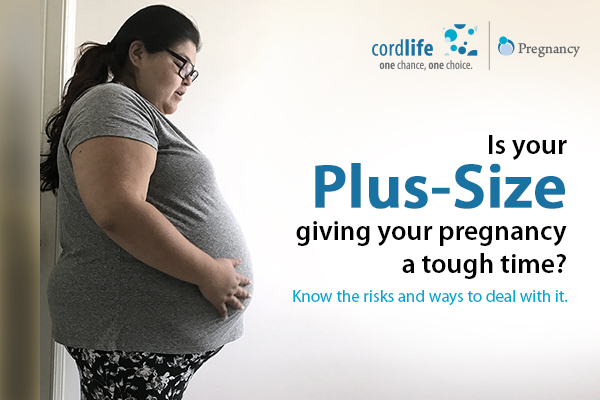Are you pregnant and worried about the impact of obesity on your pregnancy? You’re not alone, and it’s natural to have questions about how your weight might affect you and your baby.
The good news is that many women with obesity have healthy pregnancies and healthy babies. However, your journey may come with some extra challenges that you need to be prepared for. Understanding the risks, knowing how to manage your health, and working closely with your healthcare provider can make all the difference.
You’ll discover practical tips and important information to help you take control of your pregnancy, reduce risks, and feel confident every step of the way. Keep reading to learn how you can support your body and your baby during an obese pregnancy.
Health Risks With Obese Pregnancy
Obese pregnancy carries several health risks for both the mother and baby. Understanding these risks helps expectant mothers and healthcare providers prepare and manage the pregnancy carefully. Obesity increases the chance of developing serious conditions during pregnancy.
Gestational Diabetes And Preeclampsia
Obese women have a higher risk of gestational diabetes. This condition causes high blood sugar levels during pregnancy. It can lead to complications for mother and child. Preeclampsia is another risk, causing high blood pressure and organ damage. Both conditions need close monitoring and treatment to protect health.
Cesarean Delivery Chances
Obesity raises the likelihood of needing a cesarean delivery. Surgery may be necessary due to labor difficulties or health concerns. C-section recovery can take longer and have more complications for obese women. Planning and support from medical teams are important to manage this risk safely.
Risks To Baby’s Health
Babies born to obese mothers face increased health risks. These include premature birth and birth defects. Babies may also have a higher chance of developing obesity and diabetes later in life. Early medical care and monitoring can improve outcomes for these infants.

Credit: www.cordlifeindia.com
Choosing The Right Healthcare Provider
Choosing the right healthcare provider is essential for a healthy obese pregnancy. The right provider offers support, knowledge, and personalized care. They help manage risks and guide you through pregnancy safely. Trust and clear communication with your healthcare team improve your experience and outcomes.
Finding Supportive Care
Look for providers who respect and understand your needs. Supportive care means listening without judgment. A good provider creates a safe space to share concerns. They offer encouragement and practical advice for healthy habits. Feeling supported reduces stress and helps you stay on track.
Personalized Pregnancy Plans
Every pregnancy is unique, especially with obesity. Your healthcare provider will tailor a plan just for you. This plan covers nutrition, exercise, and weight gain goals. It also includes steps to prevent complications. Personalized care helps keep both mother and baby healthy.
Monitoring Maternal And Fetal Health
Regular check-ups are vital to monitor health closely. Your provider will watch for signs of gestational diabetes and high blood pressure. They also check the baby’s growth and development carefully. Early detection of problems allows timely care. Frequent monitoring gives peace of mind throughout pregnancy.
Nutrition Tips For Obese Pregnancy
Nutrition plays a key role during obese pregnancy. Eating the right foods supports the health of both mother and baby. A balanced diet helps manage weight and reduces health risks. Simple changes in daily meals can make a big difference. Focus on quality, not quantity, and choose nutrient-rich foods.
Balanced Diet Essentials
A balanced diet includes all food groups in the right amounts. Prioritize whole grains, lean proteins, healthy fats, and plenty of fruits and vegetables. These foods provide important vitamins and minerals for pregnancy. Limit processed foods high in sugar and unhealthy fats. Drink enough water to stay hydrated and support metabolism.
Foods To Include And Avoid
Include foods rich in fiber like oats, beans, and leafy greens. Protein sources such as chicken, fish, eggs, and legumes help build baby’s tissues. Choose healthy fats from nuts, seeds, and olive oil. Avoid sugary snacks, fried foods, and high-calorie beverages. Limit salt intake to help control blood pressure. Steer clear of raw or undercooked seafood and meats.
Managing Portion Sizes
Control portion sizes to avoid excessive weight gain. Use smaller plates to help eat less naturally. Eat slowly and stop when full, not when the plate is empty. Divide meals into smaller, frequent servings during the day. Avoid large meals late at night. Keeping portions balanced helps maintain steady energy and supports healthy fetal growth.
Safe Exercise Options
Exercise during an obese pregnancy helps improve health for both mother and baby. Choosing safe activities reduces risk and supports well-being. Always consult your healthcare provider before starting any new exercise routine.
Focus on gentle and low-impact exercises that suit your body and pregnancy stage. Staying active can ease common pregnancy discomforts and boost mood.
Benefits Of Prenatal Activity
Exercise improves circulation and reduces swelling in the legs. It helps control weight gain and lowers the risk of gestational diabetes. Staying active can also ease back pain and improve sleep quality. Regular movement boosts energy and helps prepare your body for labor.
Recommended Exercises
Walking is simple and effective for most pregnant women. Swimming supports your body and relieves joint pressure. Prenatal yoga enhances flexibility and promotes relaxation. Gentle stretching keeps muscles loose and reduces tension. Avoid high-impact or risky activities that may cause falls or injury.
Listening To Your Body
Pay attention to how you feel during and after exercise. Stop if you experience pain, dizziness, or shortness of breath. Rest when you feel tired or overheated. Modify exercises as needed to stay comfortable and safe. Your body knows best; honor its signals to protect yourself and your baby.
Weight Gain Guidelines
Managing weight gain during an obese pregnancy is key to reducing health risks. Following clear guidelines helps support both mother and baby’s well-being. Careful planning and monitoring make the journey safer and more comfortable.
Recommended Weight Gain Limits
Doctors usually suggest gaining less weight than women with a normal body mass index. The general limit for obese pregnant women is about 11 to 20 pounds. This range helps lower chances of diabetes, high blood pressure, and delivery problems. Staying within these limits supports a healthier pregnancy.
Tracking Progress
Regular check-ups help track weight gain and overall health. Healthcare providers measure weight at every visit. Keeping a personal record of weight changes can also be useful. Monitoring progress ensures that any issues are spotted early and addressed quickly.
Adjusting Plans As Needed
Every pregnancy is different and may need changes in the weight gain plan. If weight rises too fast or too slow, doctors may suggest adjusting diet or exercise. Flexibility in the plan helps meet the unique needs of both mother and baby. Open communication with healthcare providers is important for these adjustments.

Credit: plussizebirth.com
Extra Testing And Monitoring
Pregnancy with obesity requires extra care to keep both mother and baby safe. Doctors often suggest more tests and closer monitoring. These steps help catch problems early and guide healthy choices. Understanding what extra testing involves can ease worries and prepare women for a smooth pregnancy journey.
Additional Prenatal Screenings
Women with obesity may need extra prenatal screenings. These tests check for gestational diabetes and high blood pressure. Ultrasounds might be done more often to watch the baby’s growth. Blood tests can monitor hormone levels and detect any early complications. Regular checkups help track health and ensure timely care.
When To See Specialists
Specialists like endocrinologists or maternal-fetal medicine doctors may join the care team. They provide extra support for managing diabetes or high-risk conditions. Seeing these experts early can prevent serious health issues. Women should follow their provider’s advice on specialist visits. This teamwork improves outcomes for mother and child.
Hospital And Delivery Considerations
Hospitals plan carefully for delivery in obese pregnancies. Staff may prepare for possible C-sections or other interventions. Extra monitoring during labor helps spot problems quickly. Anesthesia teams also adjust plans to keep mothers comfortable and safe. Choosing a hospital experienced with high-risk pregnancies improves care quality.
Emotional Wellbeing And Support
Pregnancy brings many emotions, especially for women who are obese. Emotional wellbeing during this time is very important. Feeling supported and understood can reduce stress and improve health. Pregnancy can be joyful but also challenging. Facing fatphobia and stigma adds extra pressure. Finding the right support and resources helps maintain mental health. This section covers key ways to protect emotional wellbeing during an obese pregnancy.
Handling Fatphobia And Stigma
Fatphobia is the unfair treatment or negative judgment of overweight people. Many pregnant women face harsh comments or looks. This can cause feelings of shame or sadness. Know that your worth is not defined by weight. Speak kindly to yourself and reject negative thoughts. Share your feelings with someone you trust. Educate others about fatphobia to create understanding. Your body is strong and doing important work. Focus on health, not appearance.
Building A Support Network
Support networks provide comfort and reduce loneliness. Family, friends, and healthcare providers can all help. Join groups for pregnant women or those facing similar challenges. Online communities offer a safe place to share stories. A good support network listens without judgment. They celebrate your progress and offer encouragement. Talking about your feelings helps ease emotional burdens. Support makes pregnancy a more positive experience.
Mental Health Resources
Mental health is vital during pregnancy. Stress and anxiety can affect both mother and baby. Seek professional help if feelings become overwhelming. Therapists and counselors understand pregnancy-related issues. Many clinics offer mental health services for pregnant women. Use helplines and support groups if you need immediate help. Practice relaxation techniques like deep breathing or meditation. Taking care of your mind supports a healthy pregnancy and birth.

Credit: www.wbur.org
Preparing For Labor And Delivery
Preparing for labor and delivery during an obese pregnancy requires careful planning and support. Understanding your options and potential challenges helps you feel more confident. Preparing early can improve outcomes for both mother and baby. This section covers birth plan options, managing complications, and postpartum care tips.
Birth Plan Options
Creating a birth plan helps you communicate your wishes clearly. Discuss pain relief choices with your healthcare provider. Vaginal delivery is possible but may need close monitoring. Cesarean section might be recommended based on your health. Include preferences for labor support and interventions. Keep flexibility in your plan for safety reasons.
Managing Potential Complications
Obese pregnancy carries higher risk of gestational diabetes and preeclampsia. Your doctor will monitor blood sugar and blood pressure closely. Early signs of labor problems need immediate attention. Prepare for longer labor or the need for surgical delivery. Follow all medical advice and attend all check-ups. Staying informed helps you manage risks effectively.
Postpartum Care Tips
After delivery, your body needs extra care to heal well. Focus on healthy eating to support recovery and breastfeeding. Gentle exercise can improve mood and strength. Watch for signs of infection or blood clots carefully. Ask for help with baby care to reduce stress. Regular follow-up visits ensure you and baby stay healthy.
Conclusion
Obese pregnancy comes with challenges but also hope. Careful planning and support matter most. Follow your healthcare provider’s advice closely. Eat balanced meals and stay active safely. Regular check-ups help catch problems early. Small changes can improve health for mother and baby.
Stay positive and reach out for help when needed. Every step counts toward a healthier pregnancy journey.


